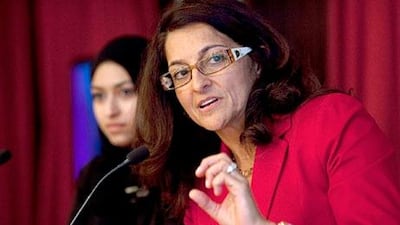Houriya Kazim is the UAE's first female Emirati surgeon specialising in breast surgery. As well as founding the Well Woman Clinic in Dubai, she also set up a breast cancer support group. She recently spoke at a Dubai networking event hosted by 85 Broads - a women's network founded by four female Goldman Sachs employees from the United States - about her career path.
How did you become a surgeon?
I became a physician first. I come from a very large family of doctors so one battle I didn't have to fight was my family. I went to medical school in Ireland and when I came back to Dubai I was working at a government hospital and it was there I realised the need for a female surgeon. A lot of the time women, not just with breast problems but anything in an intimate area of her body, would not want the male consultant examining her. It struck me in the government hospital - and that was almost 30 years ago - the advanced cases of breast cancer I saw; I had never seen [such cases] as a student or even in my medical textbooks. There were many reasons for that - superstition and modesty - so the advanced cases were always in my head. So I went back to the UK to do my training as a surgeon.
How did you come to specialise in breast surgery?
I became a surgeon and I thought: I haven't done much cancer surgery so I will apply to this famous cancer hospital, the Royal Marsden in London. I wanted to be there for six months to know what cancer surgery is like. I was shortlisted and what I didn't realise was that there were several jobs up for offer, all in different speciaisations. They tossed a bit of paper at me and said: "which job do you want?" And because breast starts with "b" it was the first one on the list so I just went "breast". My first day in the breast clinic was a revelation and I thought: "this is what I want to do with my life".
How was your return to Dubai?
I came back in 1998 thinking: I am going to save all these women. I didn't have a lot of problems in my own country. The main reason is that people saw the need for it. One of nicest things said to me by a male surgeon was: "It's great since you came back to Dubai because I don't see any more advanced cases of breast cancer".
You also founded an NGO, Breast Friends, why was that?
Initially we raised money for education and awareness and now we use the money to pay for patients' healthcare costs. We would have liked to have gone into locally based research. Even though we do all the right things like have children, breastfeed and don't take too many hormones, we [Emirati women] get breast cancer much younger and much more aggressively than women in the West. But all the research comes out of the West. Until two years ago, any type of cancer treatment was free [in the UAE] if you were here legally but that has changed. There are a huge number of women here who have no, or inadequate, insurance.
You now also do your best to help women stay in work.
There is a lot of pressure [on Arab women] to get married and have children. When I came back [to the UAE] at 29, I was geriatric. Then if you are working your husband is saying: "Well, my friends' wives aren't working". It looks like he can't provide for the family. There are lots of issues that are overcome by things like job sharing. In my own office I only hire women and all but one have young children. They are all free to come and go as they like. So if there is an award ceremony at school, they are free to go. I lose money; it's not ideal from a financial point of view but they want to work because now they have the ideal job.

